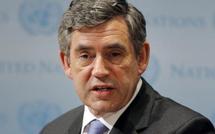British PM defiant after losing key press backing
Guy Jackson
BRIGHTON, Guy Jackson - Prime Minister Gordon Brown voiced defiance Wednesday despite losing the support of Britain's top-selling daily newspaper, in a fresh blow to his already slim re-election hopes.
The Sun splashed the headline "Labour's lost it" across its front page and announced it was switching its allegiance to the opposition Conservatives for next year's poll after supporting Labour for the past three elections.

The tabloid's support is considered by party strategists as crucial to winning over voters.
Tony Blair made it a priority to woo Murdoch in the run-up to the 1997 election in which his revamped Labour Party ousted the Conservatives. The paper maintained its support for the 2001 and 2005 polls.
The timing of the announcement -- eight months before the likely election date and midway through Labour's conference in Brighton -- was timed to inflict maximum damage on Brown after he tried to rally the party with a speech.
Brown played down the impact, saying: "The British people will decide the election, not a newspaper."
He told BBC television that voters would take a "rather different view from The Sun" if they looked at the pledges in his address Tuesday to crack down on youth crime, curb bankers' bonuses, and hold a referendum on changing Britain's first-past-the-post voting system if Labour wins the election.
Business Secretary Peter Mandelson said that in an increasingly Internet-based world, The Sun's support had lost its significance.
"The truth is that newspapers neither have the circulation nor the influence that they once did," he told Sky News.
And Labour's deputy leader Harriet Harman turned her fire on the newspaper renowned for picturing topless women, saying "the nearest their political analysis gets to women's rights is page three's news in briefs."
But Conservative leader David Cameron said the paper had chosen a winner.
"I think they have seen the government is exhausted and out of ideas and they see a regenerated, refreshed Conservative Party ready to serve," he told LBC radio in London.
Labour came to Brighton looking for fresh impetus, but the conference has produced little good news. A poll released Tuesday showed the party has slipped to third choice in voters' intentions for the first time since 1982.
The Conservatives came top on 36 percent, the Liberal Democrats, Britain's third party, were second on 25 percent, followed by Labour on 24 percent, according to the survey of some 1,000 adults by Ipsos earlier this month.
Even traditional Labour-supporting newspapers like The Guardian said Brown's speech was probably his last to a conference as prime minister.
"It was full of reminders of the good Labour has done, but little was bold enough to turn the hostile tide," the paper's columnist Polly Toynbee wrote.
"What you see is what you get -- and the voters have seen it, they get it and they don't much like it."
Labour party members insisted however that the outcome of the election was not a foregone conclusion.
Bhavna Joshi, 32, a prospective Labour candidate in a Conservative-held seat in southern England, said: "The British media is to blame for saying that people want a change of government. I am just not convinced of that."
She said she had been encouraged by the sense of unity at the conference: "I think there were times when we were feeling that we couldn't catch up, but since I have been here I feel a real sense of revival."
-------------------------------------------------------------------------------------------------------------------------